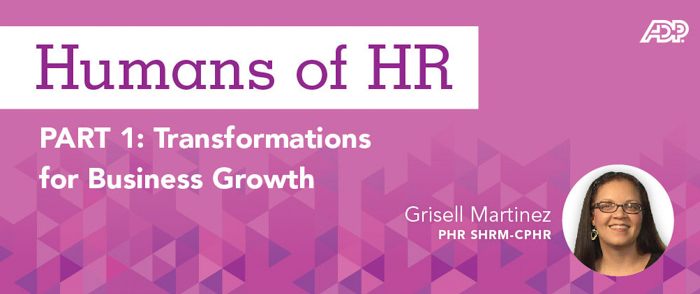Humans of HR: HR Transformations With Business Growth

This article was updated on July 22, 2018.
Grisell Martinez is the senior manager of HR and payroll at an IT solutions provider based in Boca Raton, Florida. During her 12-year tenure, the business grew from 100 employees to 403 in nearly 30 states, with 70 percent working remotely. Given her experience during this incredible growth, we spent some time picking her brain about HR transformations with business growth and the challenges she's had to face to keep the organization on track.
How Has HR Changed Since You Joined Your Organization?
Everything was done manually. We had a time clock on the wall with time cards. Reports were done in Excel. So, right away, the first thing I implemented was report writing software. The next was timekeeping — we had hourly employees digitally punch in and out. After that, we expanded to all employees by allowing online vacation time requests. That was a major implementation.
Everything was done in Excel, so we implemented a general ledger interface with our services provider. But I found I was left with many systems that all required different user names. My account manager introduced me to integrated payroll and time tracking software and recruiting and performance management modules, which I didn't have before. Since performance management had always been a paper form, I jumped at the chance to automate and added recruiting too. In the last three years, we've implemented the compensation module, which allows for online worksheets that make the annual increase process a snap. With these changes, I consider this a very efficient, very paperless HR department utilizing as many tools as possible to automate processes.
Has HR Played a Big Role in Your Firm's Expansion? How Has Your Role Changed?
Definitely, because we're able to continue adding staff without adding overhead. We've been instrumental in helping the business grow. But the business has also changed a lot. I answered a lot of questions from employees because they didn't have access to their own information. For example, if an employee was processing a load at a car dealership, they'd call HR to fax a pay stub copy. Now, they log on to the HCM app on their phones and download the information they need.
We've also reduced work that wasn't adding any value. I was doing a lot of paperwork. Now, I focus on employee relations and performance issues. My team was mostly doing paperwork and now they're focused on recruitment. They can provide better services to our managers by giving them personalized recruitment support. They're helping hire salespeople who bring revenue to the organization. We're focusing the department on more revenue-producing tasks.
HR Transformations With Business Growth Can Be Tricky, What Was Your Experience Like and Do You Have Any Advice?
The business size quadrupled and the HR team only doubled. So, that tells you something — we're very efficient. Delegate transactional HR functions to others on your team and focus on being strategic, keeping the organization out of trouble by keeping us compliant. So focus on compliance, employee relations and more strategic, revenue-producing tasks rather than paperwork and monitoring an inefficient team.
My advice to an HR person in a leadership role is to automate as much as possible. If you have to outsource tasks that don't add any value, do so and focus on people, development, bringing in top performers and lowering your risk for the business when it comes to government regulations and employee relations.
Want more Humans of HR? Check out Part 2 on the Employee Experience and Part 3 on Company Policy Changes.



